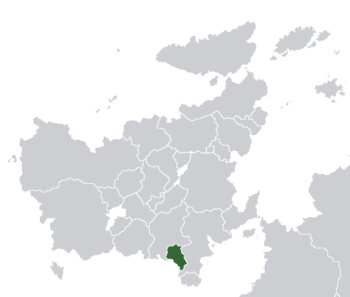User:Glitter/Piraea: Difference between revisions
No edit summary |
m (1 revision imported) |
Revision as of 06:17, 23 March 2019
This article is incomplete because it is pending further input from participants, or it is a work-in-progress by one author. Please comment on this article's talk page to share your input, comments and questions. Note: To contribute to this article, you may need to seek help from the author(s) of this page. |
Piraean Republic Πειραιηκή Δημοκρατία Pireikí Dimokratía (Piraese) | |
|---|---|
| Motto: «Ελευθερία ή Θάνατος» Elefthería í Thánatos "Freedom or Death" | |
| Anthem: "Ύμνος προς την Ελευθερίαν" "The Homeland" | |
 Piraea (dark green) in Euclea (light grey). | |
| Capital and largest city | |
| Official languages | Piraese |
| Ethnic groups (2015) |
|
| Demonym(s) | Piraean, Piraese |
| Government | Unitary parliamentary republic |
• President | Pavlos Kassapidis |
• Prime Minister | Maria Theopeftatou |
| Legislature | Piraean Senate |
| Council of State | |
| Chamber of Deputies | |
| Establishment | |
• Grand Duchy of Alikianos | 1729 |
• Kingdom of the Piraese | 1857 |
• First Republic | 1948 |
| Population | |
• 2019 estimate | 13,645,000 |
• 2015 census | 13,284,889 |
| GDP (PPP) | 2019 estimate |
• Total | $377.475 billion |
• Per capita | $27,664 |
| GDP (nominal) | 2019 estimate |
• Total | $206.544 billion |
• Per capita | $15,137 |
| Gini (2018) | low |
| HDI (2017) | very high |
| Currency | Drachma (PRD (₯)) |
| Time zone | Euclean Central Time |
| Date format | dd-mm-yy |
| Driving side | right |
| Calling code | +42 |
| ISO 3166 code | PRA |
| Internet TLD | .pr |
Piraea (Piraese: Πειραιάς), officially the Piraean Republic (Piraese: Πειραιηκή Δημοκρατία) is a country located in Southern Euclea located along the Mazdan Sea. It borders Amathia to the north and Etruria to the east. Alikianos is the capital and largest city, followed by Mousouroi. Piraea has an area of x square kilometres (x square miles) and as of 2015 has a population of approximately 13 million, most of whom belong to the High Epismialist Church.
The modern Piraean state emerged following the end of the Pereramonic Wars. Under the Treaty of Savona, the Grand Principality of Alikianos was established. The October Uprising saw ethnic Piraeans revolt against Vespasian rule under the Kingdom of Vespasia. Following the diplomatic intervention of the Euclean powers, the Kingdom of the Piraese was established in 1857. During the Great War, Piraea declared support for Gaullica and the Entente. It was defeated and lost Tarpeia to Etruria, resulting in long-lasting tensions over the disputed territory. King Georgios II was forced to abdicate and a regency was established under Prince Paulos. During the regency a low-intensity civil war began between the government and collectivist rebels. The country was unprepared for the Solarian War and the military intervened to oust the Paulos government. The first republic was established after the war but democratic rule ended following a military putsch in 1961 after the military seized power in Etruria. Leftist paramilitary groups began to confront the government again in 1967, resulting in a period of increase violence and government crackdowns. Following protests from student and labor groups over worsening economic conditions, the military government fell and the current system was established.
Piraea is a unitary parliamentary republic and developed country high standard of living. The current president is Pavlos Kassapidis, who serves as a largely ceremonial head of state. The government is led by the prime minister, currently Maria Maria Theopeftatou. The supreme legislative authority in Piraea is the Piraean Senate. Since democratization began in 197X, the Piraese Socialist Worker's Union (PSEE) has consistently been the largest party in the legislature. The country is a member of the Community of Nations, International Council for Democracy, Global Institute for Fiscal Affairs, and the International Trade Organisation. It has twice been a candidate for membership in the Euclean Community, but both bids have failed. Piraea is not currently pursing a bid for membership.
The Piraean economy is dominated by service and industrial sectors. The country also has a strong agriculture sector, with cotton, tobacco, olives, and wine being lead exports. Another significant component of the economy is tourism. Piraea regularly ranks among the most popular tourist destinations in Euclea and in the world. The government controls a portion of the economy, with substantial government expenditure. The Euclean Community is Piraea's most important trading partner. The state provides social security and universal health care systems in addition to tuition-free primary and secondary education. The state supports the advancement of Piraean culture through a number of public institutions, especially found in media and publications.
Etymology
The name Piraea comes from the Ancient Piraese name Πειραιεύς (Peiraieús), which roughly means 'the place over the passage'. Over time the Ancient Piraese evolved into the (modern Πειραιάς (Piraeus). Piraea is the embricized version of Piraeus.
History
Early history
High Piraese Period and Solarian Rule
Middle Ages
Piraean statehood
Grand Principality of Alikianos
Kingdom of the Piraese
Industrialization, the Great War, and the Regency
First Republic and military rule
Following the defeat of the Etrurian Revolutionary Republic in the Solarian War in 1946, το ζήτημα της μοναρχίας (The Question of the Monarchy) dominated post-war Piraean politics. Many reformists and liberals were opposed to restoring the monarchy, which had remained mired in controversy and a prolonged regency following the Great War. However, conservatives and Epismialists supported the continuation of the monarchy under the House of X. Interest in a foreign monarchy, especially one from Werania, had subsided. Despite the plans to put a junior member of the House of Schwarzollen-Brücken on the Piraese throne, Weranian support for Etruria during the Solarian War and its refusal to joint the Community of Nations sponsored intervention made a Weranian monarch unacceptable. A new constitution drafted in 1947 mandated a democratic, representative, and republican government that abolished the monarchy. This angered many conservatives, but the lack of a popular claimant saw minimal public support for the continuation of the monarchy. As such, the First Republic was established. The abolition of the monarchy satisfied the collectivist and republican militias, many of which went became dormant while some evolved into paramilitary groups.
Despite the new democratic constitution, Piraea did not have a strong democratic tradition. This presented problems for the young republic. Suffrage in the kingdom was restricted to landowning males. However, the 1947 constitution expanded suffrage to all men. The majority of the Piraean population was illiterate, meaning many newly enfranchised voters struggled to read the ballots. Electoral fraud became common as a result, as did bribery. The conservative National Democratic Party (EDK) used this to their advantage, often working with the Epismialist clergy to secure victory in elections. They were opposed by the reformist Radical Union (RE), which sought to further liberalize society and build Piraea in the image of other Euclean states. The country attempted to join the Euclean Community in 1955, but is bid was rejected as it did not meet EC standards. Successive governments identified this as a priority and began to implement reforms to meet entry requirements, but where thwarted by corruption and cronyism largely sponsored by the EDK.
The 1960 establishment of the military government in Etruria worried many within the armed forces, who had little faith in the ability of the republic to effectively resist Etruria should another war break out. In 1961, the Etrurian military seized the Apokoronas Islands off the coast of Tarpeia. The civilian government, led by Vassilios Michaloliakos of the RE, was unwilling to go to war and instead lodged a series of diplomatic protests against Etruria. Diplomatic attempts failed to resolve the crisis. Now convinced that the civilian government was unable to stand against the Etrurian military dictatorship, senior officers in the Piraean military staged a bloodless pustch, the second in Piraea's Post-War history. The pustch took place while Michaloliakos was abroad in Kesselbourg lobbying foreign governments to support Piraea in the Apokoronas Incident. He refused to resign as prime minister. In retaliation, the military arrested senior cabinet officials. After this, Michaloliakos resigned and remained in exile in Kesselbourg. The military government began a severe crack down on civil liberties and heavily censored the media, bringing it all under state control. Labor unions were also cracked down on with many forcibly disbanded. Most reformist and leftist parties were outlawed, including the Civic Union, the smaller Piraese Socialist Worker's Union, and the People's Collectivist Front. A number of government party officials were arrested and tried by the military government.
The leftist paramilitary groups that did not disband following the war mobilized against the military government, beginning in 1963. The conflict lasted for several years resulting in a number of violent confrontations, kidnappings and terrorist attacks. Global economic downturn in the 1970s/80s presented significant problems for the military government, which collapsed when students began to occupy universities throughout the country. In response, the military government order soldiers to confront the students. However, many of the soldiers were young conscripts and did not wish to fire upon the students, with many conscripts instead declaring loyalty to the students. The Piraese Socialist Worker's Union, which had previously gone underground following its prohibition, called for a general strike of all workers. Many workers refused to show up to work or began to occupy their places of work. The military government, fearful of a violent collectivist revolution, collapsed and allowed for civilian rule to continue.
Second Republic
Ioannis Apostolou, who was the once exiled leader of the Piraese Socialist Worker's Union (PSEE), returned from exile in Glytter to campaign in the 19XX general election, held under the 1947 constitution. Apostolou's PSEE won a majority of the seats in the election and promised to pursue a new constitution. Despite a push for the restoration of the monarchy from conservative politicians and the Espismalist Church in Piraea, a democratic and republic constitution was promulgated on 1 June 19XX.
The socialist PSEE, initially led by Apostolou for over a decade, dominated in government over the next four decades, with occasional interruptions by the conservative Homeland Party (PK). Successive PSEE governments invested significantly in the economy, increasing public spending and social programs. This gave way to significant economic development and helped turn Piraea into a modern Euclean country. Following democratiziation, Piraea saw significant investment from the International Council for Democracy, which further contributed to its economic growth and helped raise its standard of living to previously unprecedented levels. Corruption and cronyism remained a persistent issue, which was combated by different governments. The first PK government was formed under Evangelos Polakis in 1994 and lasted until 1998. During this period, neoliberal economic reform was implemented to fight growing economic stagnation. Polakis was unseated by the PSEE in the 1998 election but led PK to victory in the 2002 election. The 2005 World Financial Crisis significantly impacted Piraea, which saw a housing bubble fostered by Polakis' reforms burst. Polakis was defeated by the PSEE in 2006. The PSEE has governed undisrupted since 2006 and has restored public spending to high levels in order to fight the economic downturn.
Consistent throughout both PSEE and PK governments was the country's second attempt to join the Euclean Community. The process was first initiated in 2002 when Piraea became a candidate to join the EC. Political and economic reform was implemented to bring the country to EC standards, icnluding new anti-corruption legislation. During this period, Piraea saw significant investment from the EC. Following negotiations, it submitted its application alongside Etruria in 2015. Both the Etrurian and Piraean bids were strongly supported by Gaullica, Florena, and Amathia. However, the 2016 Etrurian referendum saw support for enlargement fall and Werania and Estmere effectively blocked Piraea's application. Despite this, Piraea has actively worked to maintain close relations with the EC. Piraea and the nationalist government of Etruria have renewed lingering tensions over Tarpeia and the Apokoronas Islands.


